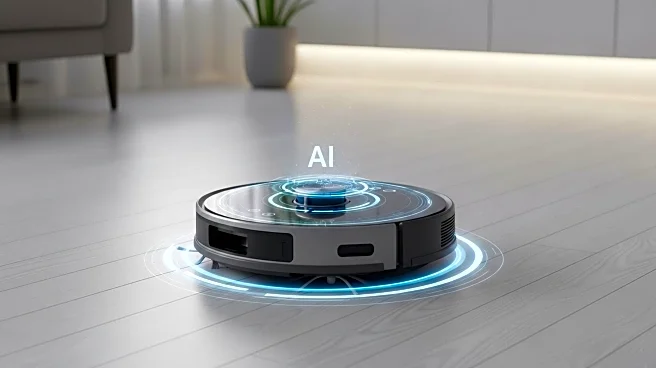What is the story about?
What's Happening?
Ecovacs has unveiled its latest robot vacuum, the Deebot X11 OmniCyclone, which incorporates local AI technology to improve cleaning efficiency. During a presentation at IFA 2025, Ecovacs emphasized that the majority of the AI capabilities are embedded within the device itself, reducing reliance on cloud connectivity. The vacuum can identify spills and messes, adjust its cleaning schedule based on user habits, and select appropriate cleaning solutions. The AI assistant, Yiko, allows users to issue broad cleaning commands using natural language. However, some functionalities, such as remote control via the app and cloud-saved video recordings, require internet connectivity. Ecovacs offers an 'Agent Hosting' mode, enabling the vacuum to operate independently without app interaction, relying solely on its onboard AI.
Why It's Important?
The introduction of local AI in the Deebot X11 OmniCyclone represents a significant shift towards more autonomous smart home devices. This development could reduce dependency on cloud services, enhancing privacy and reliability for users. By embedding AI capabilities directly into the device, Ecovacs addresses concerns about data security and internet outages affecting device performance. This move may influence other manufacturers to adopt similar strategies, potentially leading to a broader trend in the smart home industry. Consumers could benefit from more efficient and personalized cleaning solutions, while the industry might see increased competition in AI-driven home appliances.
What's Next?
Ecovacs may continue to refine its local AI technology, potentially expanding its application to other smart home devices. The company could explore integrating the AI voice assistant entirely on-device, further reducing cloud dependency. As the Deebot X11 OmniCyclone gains traction, competitors might respond by developing their own local AI solutions, driving innovation in the sector. Consumer feedback will likely play a crucial role in shaping future iterations of the product, influencing the balance between cloud and local AI functionalities.
Beyond the Headlines
The shift towards local AI in smart home devices raises ethical and legal considerations regarding data privacy and security. As devices become more autonomous, manufacturers must ensure robust safeguards against unauthorized access and data breaches. Additionally, the evolution of AI in home appliances could lead to cultural shifts in how consumers interact with technology, potentially altering daily routines and household management practices.
















